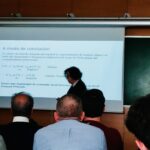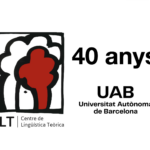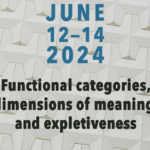4 març, 2023
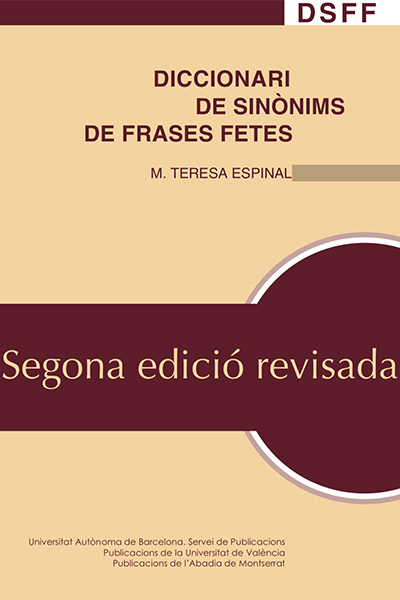
Autors:
M. Teresa Espinal
Títol:
Diccionari de Sinònims de Frases FetesEditorial: Universitat Autònoma de Barcelona
Data de publicació: 2018
Text completAquest Diccionari de Sinònims de Frases Fetes (a partir d'ara DSFF) és un diccionari conceptual d'expressions lexicalitzades, atès que sota conceptes agrupa informació gramatical i lingüística referida a expressions lexicalitzades de naturalesa gramatical diversa, allò que en la gramàtica tradicional s'han anomenat genèricament locucions i frases fetes. Per informació gramatical s'ha entès el conjunt de propietats que dona compte de la manera com es construeix una expressió lexicalitzada: propietats sintàctiques, semàntiques, lèxiques, morfològiques i fonètiques, si escau. Per informació lingüística s'ha entès el conjunt d'informacions complementàries que en certes ocasions acompanya la descripció d'una expressió lexicalitzada: propietats dialectals (marcatge dialectal d'una expressió i variants dialectals), normatives, etimològiques, etc.
18 març, 2014
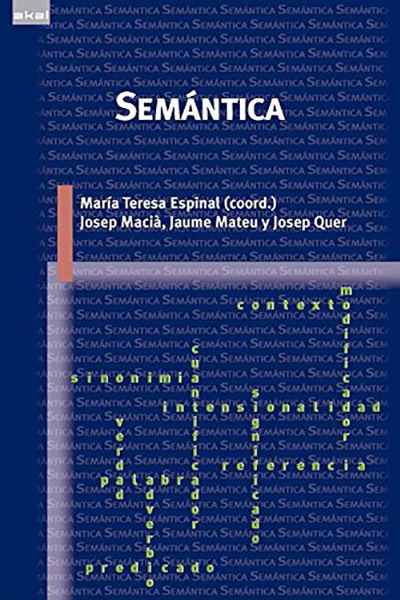
Autors:
M.Teresa Espinal (Coord.), Josep Macià, Jaume Mateu, Josep Quer
Títol:
SemánticaEditorial: Akal
Data de publicació: 2014
Pàgines: 352ISBN13: 978-84-460-3943-3
Més informacióLa Semántica es el estudio del significado. El libro que aquí presentamos es un manual sobre dicha materia que tiene fundamentalmente dos objetivos: el primero, introducir a los estudiantes en los temas centrales de la teoría del significado (cuestiones que son típicamente lingüísticas; problemas que se han planteado en filosofía del lenguaje y en lógica y que son pertinentes en teoría lingüística, y problemas que tienen un interés en semántica gracias a los avances producidos en áreas afines como la psicología cognitiva); el segundo, iniciarles en el discurso propio de la argumentación lingüística para el planteamiento y resolución de problemas de significado de las lenguas naturales.
El libro está organizado en ocho capítulos. El primero incluye una reflexión sobre las unidades de estudio de la Semántica y la operación básica de composición del significado, al que sigue otro dedicado a las unidades léxicas y al tipo de significado e información que estas pueden codificar. En el tercero se aborda la noción de referencia y otras relacionadas con ella, en las que se fundamenta la Semántica de Condiciones de Verdad. En los capítulos que siguen se estudian con cierto detalle las nociones de predicación, cuantificación, modificación e intensionalidad; en ellos se discuten fundamentalmente datos del español para justificar las hipótesis y los conceptos teóricos que se presentan. En el último, pensado para estudiantes de posgrado, se plantean problemas de interfaz sintaxis-semántica y de interfaz gramática-cognición, cuyo objetivo fundamental es relacionar y reflexionar sobre algunos conceptos y nociones introducidos en los capítulos precedentes.
Todo ello se acompaña de un abundante material complementario en forma de bibliografías, ejercicios y actividades, que hacen del libro una herramienta fundamental para iniciarse y profundizar en una de las áreas básicas para el conocimiento y dominio de la lengua.
25 març, 2020
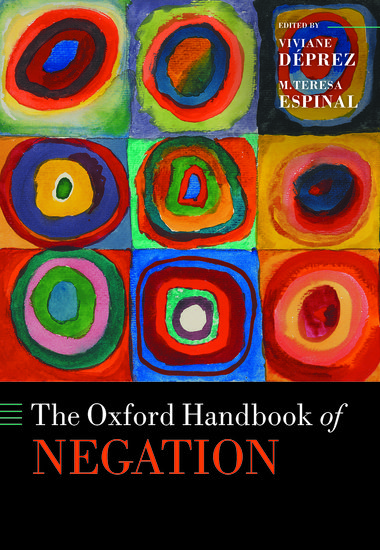
Autors:
Déprez, V. & M.T. Espinal (eds.)
Títol:
The Oxford Handbook of NegationEditorial: Oxford University Press
Data de publicació: 25 de març del 2020
Pàgines: 896ISBN13: 9780198830528
Més informacióIn this volume, international experts in negation provide a comprehensive overview of cross-linguistic and philosophical research in the field, as well as accounts of more recent results from experimental linguistics, psycholinguistics, and neuroscience. The volume adopts an interdisciplinary approach to a range of fundamental questions ranging from why negation displays so many distinct linguistic forms to how prosody and gesture participate in the interpretation of negative utterances. Following an introduction from the editors, the chapters are arranged in eight parts that explore, respectively, the fundamentals of negation; issues in syntax; the syntax-semantics interface; semantics and pragmatics; negative dependencies; synchronic and diachronic variation; the emergence and acquisition of negation; and experimental investigations of negation. The volume will be an essential reference for students and researchers across a wide range of disciplines, and will facilitate further interdisciplinary work in the field.
8 juny, 2022
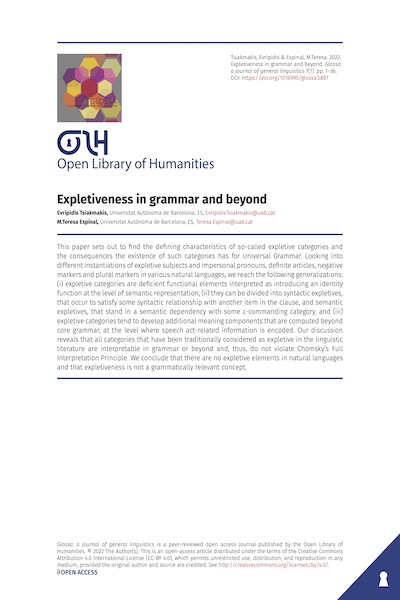
Autors:
Tsiakmakis, E. & M.T. Espinal
Títol:
Expletiveness in grammar and beyondEditorial: Glossa: a journal of general linguistics, 7(1)
Data de publicació: Maig del 2022
Text completThis paper sets out to find the defining characteristics of so-called expletive categories and the consequences the existence of such categories has for Universal Grammar. Looking into different instantiations of expletive subjects and impersonal pronouns, definite articles, negative markers and plural markers in various natural languages, we reach the following generalizations: (i) expletive categories are deficient functional elements interpreted as introducing an identity function at the level of semantic representation, (ii) they can be divided into syntactic expletives, that occur to satisfy some syntactic relationship with another item in the clause, and semantic expletives, that stand in a semantic dependency with some c-commanding category, and (iii) expletive categories tend to develop additional meaning components that are computed beyond core grammar, at the level where speech act-related information is encoded. Our discussion reveals that all categories that have been traditionally considered as expletive in the linguistic literature are interpretable in grammar or beyond and, thus, do not violate Chomsky’s Full Interpretation Principle. We conclude that there are no expletive elements in natural languages and that expletiveness is not a grammatically relevant concept.
15 agost, 2022
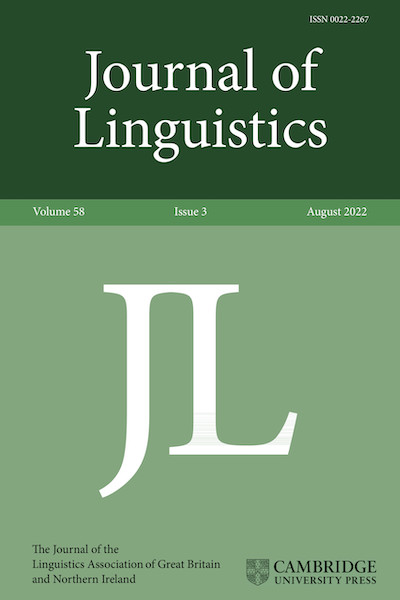
Autors:
M.T. Espinal & Sonia Cyrino
Títol:
A syntactically-driven approach to indefiniteness, specificity and anti-specificityEditorial: Journal of Linguistics 58(3), Cambridge University Press
Data de publicació: Agost 2022
Més informacióIn this paper we present an original approach to analyze the compositionality of indefinite expressions in Romance by investigating the relevance of their syntactic distribution in relation to their meaning. This approach has the advantage of allowing us to explore the question of how syntactic structure can determine the meaning of different forms of indefiniteness. To that end, we postulate a common derivation for bare plurals, bare mass and de phrases, whereby an abstract operator DE is adjoined to definite determiners and shifts entities into property-type expressions. Quantificational specificity is proposed to be derived from a syntactic structure in which weak quantifiers select for indefinite DE-phrases, no matter whether de is overt at Spell-Out or not; these quantifiers turn properties into generalized quantifiers. The anti-specificity meaning of some indefinites is derived by adjoining in the syntactic structure an abstract operator ALG that encodes the speaker’s epistemic state of ignorance to a quantifier encoded for specificity, and it turns a generalized quantifier into a modified generalized quantifier. The paper also brings some general predictions on how indefiniteness is expressed in Romance, as it provides extensive support from five Romance languages: Brazilian Portuguese, Catalan, French, Italian and Spanish.







